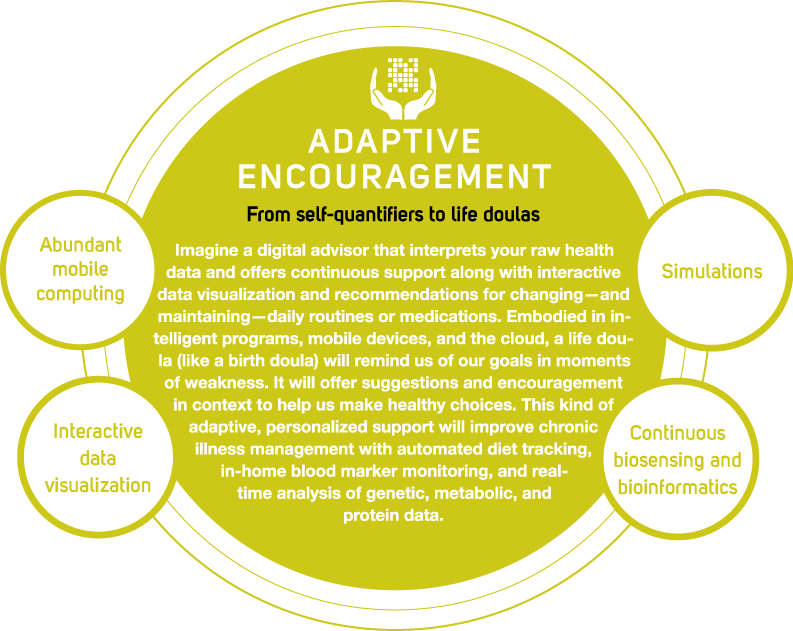Future Now
The IFTF Blog
Wanted: Adaptive Encouragement
It’s that time of year again. The global holiday of January 1, and with it, the annual ritual of self-improvement: setting New Year’s resolutions. It’s a time when we’re called on to reflect on our lives and the behaviors we might want to change—and bombarded with ideas on how to do so. It’s the time of year that makes me crave the realization of one of our Science and Technology forecasts: Adaptive Encouragement.
Adaptive encouragement: From self-quantifiers to life doulas
Imagine a digital advisor that interprets your raw health data and offers continuous support along with interactive data visualization and recommendations for changing—and maintaining—daily routines or medications.
Embodied in intelligent programs, mobile devices, and the cloud, a life doula (like a birth doula) will remind us of our goals in moments of weakness. It will offer suggestions and encouragement in context to help us make healthy choices.
This kind of adaptive, personalized support will improve chronic illness management with automated diet tracking, in-home blood marker monitoring, and realtime analysis of genetic, metabolic, and protein data.
A quasi-intelligent automated system that takes the heavy lifting out of learning about your habits and changing them? Sold!
This vision is part of a future when roles like life coaching are automated and extended through ever-present technology. It also points to the possibilities of adapting care systems to optimize the well-being of people with chronic ailments: rather than a slap on the wrist at the doctor’s office, you get a gentle vibration to get you out of your chair and moving. Haptic feedback and sensitivity, emotional support and peer interactions are the future of this softer side of mobile health, beyond the expert-fed prescriptive reminders. This is a future of gentle nudges to show us the actions that will help us increase our capacity for well-being, but also remind us to do nothing when that’s what's really best for us.
Our colleague Alex Charmichael over at the Quantified Self wrote this forecast, and I’ve heard it echoed in the desires of my of the quantified selves I’ve been interviewing for our project for the RWJF building and refining the QS Guide to Self-tracking Tools. For those of us who generally only embark on self-improvement binges once a year, there are a lot of lessons and tools we can learn from both the continuous and episodic efforts of the QSers. One tool I learned about in interviews that might be of particular interest to New-Years Resolvers is Health Month—a game that helps you focus on making progress towards your goals on a daily basis. (The game starts promptly on the first of each month, so start on Jan 1st to get credit for your progress!)
Most importantly though, one of the key lessons I’ve heard that’s especially crucial for new years resolutions is self-compassion in all your self-tracking and self-improvement efforts. Shame and frustration at little slip ups can do a lot of harm—so this year, try staying future-focused and forgiving.




